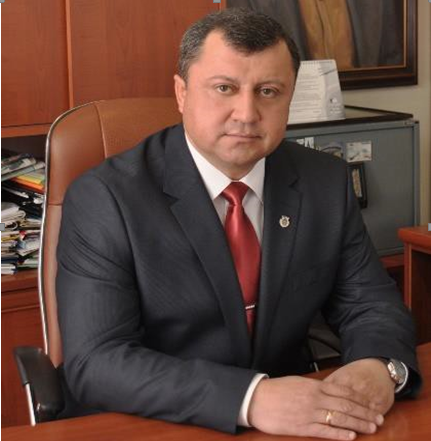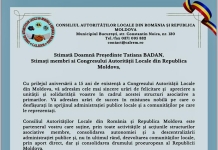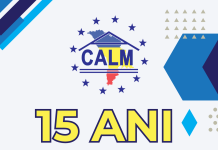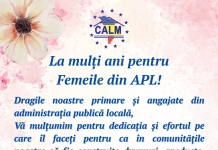The fifteenth General Assembly, held from 27-30 April 2020, marked an important milestone in the headway of the Network of Associations of Local Authorities in South-East Europe (NALAS) on its path to advancing the role of local government in South-East Europe. This General Assembly was not an ordinary one. Working under the pressure to respond to all the challenges of the COVID-19 crisis, the delegates, Mayors representing NALAS member Associations, casted their votes online, deciding about important NALAS issues for the future.
Based on the rotation Presidency system, Mr. Emanuil Manolov, Mayor of Pavlikeni Municipality in Bulgaria, assumed the role of NALAS President, who will lead the Network in the next year.
Mr. Manolov is Mayor of Pavlikeni Municipality since 2011. Under his leadership, the municipality has managed to attract EU funding of 50 million euros and was twice awarded with the European Label of Governance Excellence (ELoGE) of the Council of Europe, while Mr. Manolov received the prestigious award Mayor of the Month in the categories Agriculture and Water Attractions.
JJ: Mayor Manolov, congratulations for the new role you just assumed, President of NALAS. Since you have been a Vice-President of the Network and a Delegate in its General Assembly on behalf of the National Association of Municipalities in the Republic of Bulgaria (NAMRB), you are quite familiar with NALAS’ work. What does NALAS mean to you personally, as a Mayor?
EM: Assuming the role of President of the Network of Associations of Local Authorities of South-East Europe is a great honour, at the same time serious responsibility. The Network has proven itself as an organisation, capable of supporting its members in the process of decentralisation and strengthening the democratic processes in accordance with the principles of the European Charter for Local Self-Government.
Over the years, NALAS has managed to build an effective, competent and qualified team and leadership. Through its active work, the organisation has gained popularity not only in the region but also at international stage, and is increasingly recognised as a key partner for the development of local authorities in SEE.
As a delegate to the General Assembly and a participant in other events organised by NALAS, I can conclude that the organisation is not only quickly developing and finding new spheres for its activities, but also successfully establishes new partnerships in the face of the European Commission, the Regional Cooperation Council, the Council of European Municipalities and Regions, etc. Thanks to pragmatic solutions and generated ideas, the members of the Network
“To me as Mayor, NALAS is a source of ideas, inspiration and an opportunity to share experiences and practices”
can count on a reliable partner to find solutions to current issues and topics, not only of regional, but also of global importance, that affect the functioning of local authorities, while taking into account their local specificities and needs.
Coming to the question of the importance of NALAS to me personally as a Mayor – it is a source of ideas, inspiration and an opportunity to share experiences and practices with each other. Creating a network of contacts and cooperation with partners from other countries in the region gives us a different perspective and at the same time is a chance to get to know each other better in our cultural diversity. Taking the advantage of cross-border cooperation opportunities, local
authorities can work more successfully on joint projects that lead to better results and improve the lives of our citizens.
We have the capacity to build sustainable communities based on smart and innovative growth through quality services and job creation. NALAS support for capacity building, advocacy, including access to alternative financial instruments and participation in various projects is crucial for the professional evolution of our administrations, for expanding the instruments and areas in which we can be of support to our citizens, for the regional cohesion, for the implementation of international commitments for sustainable development or for attracting investment.
JJ: You assumed this role in quite difficult times, demonstrating your personal leadership and the leadership of NAMRB. What are your priorities during the next twelve months? Where would you like to lead the Network and what personal footprint to leave?
EM: Today, we find ourselves in an unprecedented situation. None of us has the experience or the ready-to- use solutions to deal with the challenges, we learn from our mistakes. But this should not discourage us, quite the contrary it should give us impetus to new ideas and opportunities. Indeed, we need to rethink the way we will achieve our goals, but not give them up. I believe that it is crucial to be consistent in our work, which will lead to successful and sustainable results.
In our capacity as Mayors, Chairpersons of local or regional councils or Councillors, we are at the forefront of the fight against the Coronavirus. The nature of the turmoil caused by COVID-19 calls for immediate action and a bold plan for economic and social recovery based on solidarity, sustainability, stability and social justice. In these difficult times, a top priority for local authorities is to guarantee the functioning of health and community services to our citizens, ensuring that no one is left behind. We make every effort to support the local economy, to save jobs, to create new employment![]()
“Around 1/3 of all public service costs and 2/3 of all public investments are made by local and regional authorities: they will be needed to rebuild our economies, to make the environment transition and to create social innovations” opportunities, to support all businesses to continue their activities. Our work on the ground complements the efforts made at national level, but there is more to be done, especially with regard to cross-border solidarity.
In this context, my main priority for the Presidency period is to focus on exploiting the potential of the partnership both within the organisation, as well as of each of the partners, together with national research centres and experts and in the spirit of solidarity to create a Network for generating of local ideas for the recovery of various economic sectors, creative and social activities that can become good examples for implementation in the partnering countries. Each member of the NALAS Network will be invited to use his or her authority and constructive relationship with regional and national authorities to promote the examples of other members and to assist national governments in seeking effective options for economic recovery and addressing the social consequences of the crisis.
At the same time, topics such as climate neutrality, circular economy and convergence between regions remain relevant. However, in order to implement them, it is necessary to find mechanisms and sources to compensate for revenue losses. In this sense, all new measures must take into account the specific experience of local authorities and support us in providing social care and other basic services to our citizens. Around one third of all public service costs and two thirds of all public investments are made by local and regional authorities: they will be needed to rebuild our economies, to make the environment transition and to create social innovations.
The role of local authorities as a major generator for the multifaceted development of communities and in-depth knowledge of the local specifics of each municipality allows for a more detailed understanding of number of economic mechanisms that are in the process of implementation or consideration at national level.
The global approach is characterised by the use of significantly broader toolkit – legislative changes, targeted programming of EU funds and resources from the state budget.
The local approach, however, is the ability to properly diagnose, to identify the specific needs of the local population, to uphold the specific focus of support measures that would help a region to recover in optimal time, based on its resources, traditions and perspective plans.
This approach, based on local competitive advantages, is an opportunity to consolidate efforts at local level to achieve a rapid exit from the crisis and to achieve the necessary diversification of measures taken at national level.
In this context, NAMRB sees significant potential in the members of the Associations of regional and local authorities to demonstrate the power of the sensible dialogue and partnership with research, education and research centres, as well as with national governments.
JJ: 9 May, the Europe Day, celebrates the peace and unity in Europe. The European integration process for the Western Balkans cannot effectively happen without strong involvement of local governments and their Associations. At regional level, NALAS has been working vigorously to be recognised as a key partner for introducing local government aspect in the Berlin Process. How do you see the role of NALAS in this process, and your personal role, based on the experience you, NAMRB and Bulgarian local governments have in the EU accession process?
EM: The SEE region is of strategic importance for the international activities of the Bulgarian Government and the topic of economic recovery through local solidarity within the rotating Presidency of NALAS can be seen as a kind of continuation of the priorities of the Bulgarian Presidency of the Council of EU in 2018.
This first-ever joint Presidency of Republic of Bulgaria and Republic of North Macedonia is a symbol of the regional ownership of the Berlin Process. It is also a positive sign that an EU Member State and a candidate country for EU membership can unite and work together in the interest of the countries of the region.
Driven by the wish of “deepening versus widening” the “Berlin Process is not a substitute for the EU enlargement. In this context, it is important for the Network to maintain and build upon its positions and recognition achieved during the previous Presidency of the Process”
Joint Presidency will build on the already established and functioning initiatives in the framework of Berlin process. Berlin Process is not a substitute for the EU enlargement. In this context, it is important for the Network to maintain and build upon its positions and recognition achieved during the previous Presidency of the Process.
The readiness to look for support and cooperation with the Western Balkan countries (WB6) was already stated at governmental level. In order to achieve concrete results for
the Sofia 2020 Summit, close cooperation will be sought with all stakeholders, including the European institutions, the Regional Cooperation Council, members of the Berlin Process, international financial institutions and others.
Only that way can the set goals be achieved in terms of connectivity, to improve economic convergence and connectivity in the region in all its aspects (transport, energy, economy, digital, new technologies, environment, people-to-people contacts, including youth, education, Roma integration, etc.).
There is no doubt that the role of local authorities in this process is important and work should be done to increase decentralisation and provide bot greater rights and resources to local authorities to implement the necessary reforms, as well as for targeted policy for training and capacity building at the local level.
JJ: What can the Associations of Local Governments from EU accession countries learn from the rich experience of NAMRB?
EM: The current state of affairs is very different from the one Bulgaria faced in the beginning of its EU accession negotiation process. The most difficult thing is to maintain the enthusiasm and desire for continuous improvement, because nothing is set in stone, and the dynamics implies a life-long learning process and progress.
“It is crucial that the place and role of local authorities in the accession process is well understood by the central government”
accession process is well understood by the central government. Ensuring the political, administrative and financial independence of local authorities is at the heart of the democratic society. In this sense, national Associations have an important role to play in the process of lobbying for and defending the interests of local self-government.
Our good contacts and cooperation with national authorities are of a great importance for the success of the reforms at local level, as well as for the effective capacity building in the local administration. NAMRB can share with all NALAS member Associations its extensive experience both in the pre- accession negotiation process, as well as in the years of EU membership.
We will use the time in which our Association is presiding over NALAS to share with all our colleagues and partners the lessons learned from this difficult path. I hope that within the mandate of this Presidency we will have the opportunity to cooperate not only digitally, but also live.
JJ: You are a Mayor of Pavlikeni Municipality for 9 years now. What is the achievement that you are especially proud of?
EM: In the past nine years, Pavlikeni municipality has achieved several important objectives. The processes of renewal and development of our infrastructure were started, we supported the cultural life and created opportunities for sports and recreation.
Pavlikeni is not among the large municipalities in Bulgaria, but it has made significant progress. Today the municipality is governed by thought, pragmatism and a vision for development. In our municipality more public investments per capita are made than in the large regional cities and the benefits of these investments are visible to everyones eyes.
Our main activities include repairs of roads and streets, construction of playgrounds and renovation of public buildings such as kindergartens, schools and the municipal hospital. An important element is the construction of new social centres for children and the overall development of the social programme of the municipality in support of our fellow citizens in need.
![]()
“We preserve our cultural heritage and it attracts more and more tourists”
Pavlikeni is already attracting new investors. Interest in our municipality is growing due to our strategic location, proximity to the currently under construction highway Hemus and the good attitude of local authorities to the problems and needs of business.
My personal cause is to open our city to international cooperation. Our relations with many European cities and municipalities are getting more intensive. Together with municipalities in Spain, we have created a model for addressing unemployment. We are working with our colleagues from Călărași on disaster prevention. We twinned with the Russian city of Starodub, the Polish Lomza, the Moldovan Leova and the Romanian Boldești-Scăeni. We have re-established relations with the Belarusian city of Pruzhany. From all these relations we can draw good ideas for the governance process and for their experience in support of citizens.
The activities related to environmental protection are among the main accents in our work. We have completed a large-scale project for construction of municipal wastewater treatment plant in the town of Pavlikeni and replacement of the sewerage network. We have introduced energy saving measures in a number of public buildings and are continuing with similar projects. We
are working on the replacement of water mains in the city, which will limit water losses in the network. During this period, the regional landfill for municipal waste treatment was built, which currently serves five municipalities. We work together with schools to increase the awareness of our children on environmental protection.
We preserve our cultural heritage and it attracts more and more tourists.
Our achievements have been praised by a number of organisations. We are the winner of an award for a prosperous municipality, we have again been awarded the European label for innovation and good governance at the local level of the Council of Europe, we meet the highest standards for quality and security of information.
In Bulgaria Pavlikeni is known as the city of beautiful people and roses. That is why I would be really pleased if NALAS member find the time and be our guests.
JJ: We live in quite turbulent times. The whole World is affected by the COVID-19 pandemic and our region is no exception. How did your Municipality adjust to the new conditions? What health, social and economy measures did you apply?
EM: Bulgarian authorities announced the state of emergency in connection with COVID-19 pandemic on 13 March. Even before that, we have activated the municipal crisis prevention plans and to this day we strictly implement the measures. Working in a global crisis has been a challenge for us, but we managed to cope quite well.![]()
“It was impressive how the new danger united the local community”
The goal of our actions is to limit the spread. Initially, all sites that we assumed might lead to large gatherings were closed – such as parks, community centres, sports facilities, museums, our zoo and others. The activity of a number of commercial sites was limited. We have taken measures to disinfect public spaces.
A number of safety measures were enforced in the municipal hospital to prevent the situation of imposing quarantine on the entire building in case of COVID-19 positive patient. Patients are tested before admission to the hospital. A separate entrance is provided for them.
We worked hard to provide protection for all municipal employees and medical workers on the first line.
The Municipality offers the service Home Social Patronage (HSP), which supports its user with food delivery and care in the households of single people, people with disabilities and people at risk. After the introduction of the state of emergency, the HSP increased the types of services provided, as well as their scope in terms of population.
We have also taken action to inform residents in detail about all aspects of our activities. A special section with information about the new disease, the measures taken and the imposed restrictions was set up on the website of the municipality. We publish a daily online newsletter. It is important to note that the information is translated also in English, because we have many foreigners living in Pavlikeni municipality.
It was impressive to me how the new danger united the local community. Many of our fellow citizens joined as volunteers and helped with the delivery of food and protective equipment in the villages. Others sewed face masks in their homes and provided them free of charge. Many companies have joined our donation campaigns with material and financial assistance.
With regard to local entrepreneurs, Pavlikeni municipality has decided to exempt from rent all
users of municipal property affected by the crisis. The deadlines for paying local taxes for 2020 have been extended. We are considering measures to support the recovery once the pandemic has been contained.
By: Jelena Janevska, NALAS Knowledge and Communications Manager









